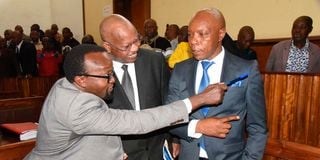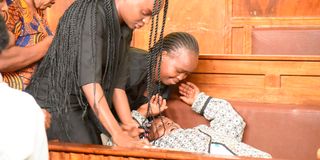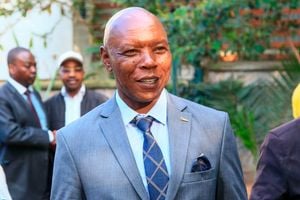
Maina Njenga with his lawyers Ndegwa Njiru and Harum Ndubi at the Nakuru law court on November 20, 2023.
On November 20, 2023, a dramatic moment unfolded in court when Ms Hannah Njoki, a key witness in the criminal case against former Mungiki leader Maina Njenga, collapsed shortly after taking the stand.
She was quickly rushed to the magistrate's chambers to receive first aid, forcing the prosecution to move on to another witness with the promise of recalling Ms Njoki later.
According to the prosecution, the elderly woman lost consciousness because of poor ventilation in the courtroom and because she had not eaten her breakfast or taken her medication.

Hannah Njoki, the first prosecution witness in Maina Njenga's case, is assisted by court staff after she collapsed while taking oath on November 20, 2023.
However, it later emerged that Ms Njoki may have faked her condition to avoid testifying against Njenga, her son-in-law.
Ms Njoki was expected to confirm that Njenga controlled a property in Wanyororo area of Bahati sub-county in Nakuru where eight of his co-accused were arrested.
Mr Njenga, along with 11 others, faced several charges including conspiracy to commit a crime, illegal possession of firearms and association with the outlawed Mungiki gang.
However, the case was ultimately dismissed after 20 witnesses crucial to the prosecution's case refused to testify.
Nation.Africa has also established that the prosecution's challenges were compounded by what has now been revealed to have been a rushed and flawed police investigation.
Political motives also appeared to be at play, leading to significant errors that left gaps in the evidence.
Court records show that only nine witnesses testified, forcing the prosecution to withdraw the charges when the remaining witnesses backed out.
It has since emerged that many of the 20 witnesses, including Ms Njoki, were not neutral parties.
Some were relatives, neighbours, employees or supporters of Njenga who had been forced by the police to testify against him, while others were government experts sceptical of the evidence presented.
Some experts either rejected the samples that did not meet the threshold, while others did not interact with the exhibits.
Ms Njoki, for example, only realised that she was to testify against her son-in-law when she took the stand, only to see him on the opposite side with the accused.
Stunned, she claimed to be unwell and refused to return.
On Monday, the prosecution admitted that Ms Njoki's testimony was essential to prove ownership of the house at the centre of the charges.
“In count 8 to 12 that requires proof ownership of the premises where the subject items found in the charges were recovered. The prosecution witness named Hannah Njoki is the mother-in-law to the first accused and is not willing to testify and hence, in absence of her evidence, the charges cannot be sustained,” prosecutor Wycliffe Omwenga told the court.
Mr Omwenga also said that the remaining 20 witnesses refused to appear, citing their ties to Mr Njenga. Their absence left a significant gap in the evidence.
Defence lawyer Steve Biko revealed that many of the witnesses were unaware of the weight of their involvement in the prosecution’s case.
“Most of them were only told to record statements on what they knew regarding the activities at the Bahati home. Ms Njoki was, for instance, just told to appear in court to confirm that the title deed was registered in her name and how Mr Njenga used the house, only to learn that her evidence was to pin her son-in-law,” said Mr Biko.
He noted that several witnesses withdrew once they understood the implications of the case. In addition, the conduct of the police during the investigation raised serious questions.
It emerged during the trial that the officers who carried out the raid on Mr Njenga's property did not follow standard procedures such as recording their presence in their respective Occurrence Books (OBs), a crucial step in documenting official actions.
At the last mention of the case, the court ordered the prosecution to provide the OB numbers of the various stations involved in the operation to raid the house at the centre of Njenga's allegations.
When it was confirmed that the officers did not follow this protocol, it undermined the prosecution's case.
Mr Omwenga acknowledged these shortcomings and cited them as grounds for dropping the charges.
“Following this court's direction that the defence be supplied with various requested OB extracts, it was established that the officers who visited the accused’s house did not book themselves as required in their respective stations OB and that greatly jeopardises the entirety of prosecution’s case,” Mr Omwenga noted.
According to Mr Biko, the police's failure to follow procedure pointed to a deeper problem, showing that the raid had an ulterior motive, in this case political, which led the officers to act unprofessionally.
He said the evidence presented to the court was tainted by this bias.
In its ruling, the court agreed with the defence, concluding that the trial was unnecessary and an abuse of judicial process.
“In as much as I sympathise with the accused persons who have been subjected to this admittedly unnecessary trial for over 18 months, the only available recourse will be to allow for the termination of the case under section 87 (a),” ruled Principal Magistrate Kipkurui Kibellion, while releasing Mr Njenga and his co-accused.









